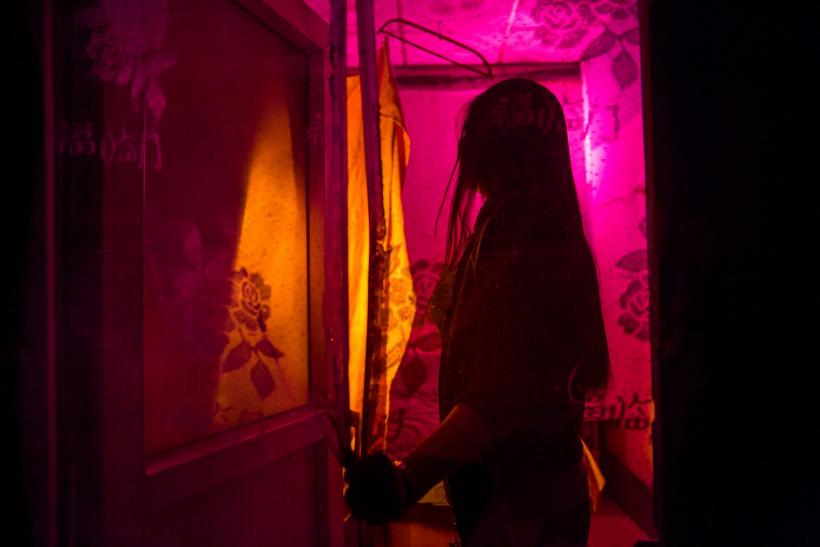
Sex workers are among the most stigmatized people in our society. Much of their work is criminalized; they are considered disgusting, degraded, and immoral. Even when they're breaking no laws, banks and other respectable establishments often refuse to do business with them.
And yet . . . at the same time, they are considered to be fascinating and exotic. From Julia Roberts in Pretty Woman 25 years ago, to the media firestorm last year around Belle Knox (the Duke student who was outed as a porn star) sex workers are seen as titillating objects of contradictory lust, pity, excitement, and shame. As people, they are scorned, but their images and stories can be hugely marketable.
Thus, A&E's newly proposed series, 8 Minutes. The reality show—set to debut on April 2—features former law enforcement officer Pastor Kevin Brown, a self-styled anti-trafficking advocate. Brown poses as a client to try to convince sex workers to give up sex work. The title, 8 Minutes refers to what Brown has decided is "the maximum amount of time to safely convince these women to leave with his team," according to the press release.
The eight-minute time frame is of course a gimmick—but then, so is the entire show. The gimmick is, specifically, the sex workers themselves, whose lives are perceived as exotic, dangerous, debased, and, most of all, consumable. "Throughout the season, we meet over forty women; ranging from one who saw her twin sister killed in front of her to another woman sold at the age of 10 by a family friend," the press release exults. By pretending to be a savior, Pastor Brown gets to observe and participate in these women's exciting, intimate pain—and with the help of hidden cameras—so does the television audience.

Meanwhile, people who actually care about trying to help sex workers are, not-so-surprisingly, universally horrified. Faith-based anti-trafficking organizers and sex work advocacy groups generally don't agree on much, but both are united in condemning this generally stupid, callous, and manipulative show. Catholic blogger Elise Hilton writing at the Action Institute said, "This is no way to treat Scripture. This is no way to treat human beings. This is not entertainment." For her part, Kate D'Adamo, the National Policy Advocate at the Sex Workers Project, told me that she had serious concerns about the safety of the women who are filmed on the program.
"This preys on marginalized people who aren't seeking public exposure and outing and publicly shames them for entertainment purposes. Forcibly outing a person can make them more vulnerable and isolated from their support systems. This is complicated and delicate work to support someone exiting a difficult situation, and it can be very personal and take a great deal of trust. Treating it as carelessly are this show does, and then promoting it for entertainment value is not just disrespectful, it's despicable."
One of the things that makes 8 Minutes especially despicable is the way in which it relies upon and capitalizes upon the stigma and marginalization that sex workers face. Audacia Ray, the director of advocacy organization Red Umbrella Project (RedUP), pointed out to me that "sex workers have a lot to lose and a lot to risk when dealing with the media." Prostitution is illegal in Houston, where the show is based, meaning the producers are capturing these women on film committing crimes.
As Ray said, "One of the consequences which may or may not be real, but which may be felt by the sex workers to be real, is if they say no, they could be documented on camera selling sex, and they could be targeted by law enforcement." The show claims that consent is obtained from the women to air the footage sometime after the 8 minutes are up—but even at that point, the disproportionate levels of power are enormous. Under the guise of philanthropy, 8 Minutes is essentially blackmailing some of the most marginalized and powerless people in society in order to get them to provide edu-tainment, thrills, and cathartic release for a jaded audience.
8 Minutes claims to be giving these women an opportunity at a new life—and how does it go about doing that? By insisting that they perform pain, pleasure, and self-revelation for a voyeuristic audience. The show is not a release from sex work; it is sex work itself—with the important and ugly difference that in many cases the women in many cases will have less ability to consent to the acts they perform, and less control over how much, or whether, they get paid.
No wonder numerous organizations have signed an open letter to the producer, Tom Forman of A&E, demanding he cancel the show. Hopefully he will. It's bad enough that our society criminalizes and terrorizes sex workers without pretending, as we watch and lick our lips, that we're doing it for their own good.






